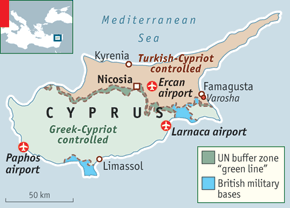THE GOVERNMENT is ready to develop a “zero-problem” relationship with Turkey, and calls on Turkish Prime Minister Recep Tayyip Erdogan to take the necessary steps towards a Cyprus solution following his victory in Sunday’s general elections.
Government spokesman Stefanos Stefanou said Erdogan won a “big victory”, even if it came short of giving them a free hand in reforming the constitution.
He said Erdogan now faced “serious problems” like the Kurdish issue, and democratic reforms which the political leadership “needs to deal with as an integral part of its EU accession course”.
Linked with Turkey’s EU accession was the Cyprus problem, “to which Turkey should finally demonstrate a constructive approach,” said Stefanou.
“The elections are over and Turkey must prove that it works in favour of a solution based on UN resolutions, and take the necessary actions that the European Council has called on it to do,” said Stefanou.
“The Republic of Cyprus is ready to build a zero-problem relationship with Turkey, and have a special relationship with both Turkey and Greece. This presupposes Turkey cooperates in achieving a just, viable and functional solution on the basis of a bizonal bicommunal federation, which will restore the country’s territorial integrity and sovereignty, as well as the human rights and fundamental liberties of all people, both Greek Cypriots and Turkish Cypriots,” he added.
Stefanou also called on Turkey to “review the arrogant positions and policies being implemented on Turkish Cypriots”.
Foreign Minister Marcos Kyprianou yesterday highlighted the importance of Erdogan’s next steps regarding the formation of coalitions to pass reforms as well as moves towards EU accession.
He said if Erdogan allied with the extreme right party in Turkey, this could mean a more nationalist approach to Cyprus. At the same time, “if he wants to approach the Kurds, he may take harder steps on other issues like the Cyprus problem”.
“Watching his first speech after the elections, we see a greater emphasis on Turkey’s leading role in the Islamic world rather than on EU issues, which shows the role he wants to play in the region, what his foreign policy priorities are,” said Kyprianou, adding that loss of interest in the country’s EU prospects was more worrying for developments in the Cyprus problem.
President Demetris Christofias’ advisor on Turkish affairs, Nicos Moudouros yesterday highlighted that “in the last few years in Turkey, the EU’s image has been turned on its head”.
He pointed out in 2002, Erdogan’s party was using the EU as a tool to legitimise efforts to modernise Turkey, take steps on the Cyprus problem, or even isolate the military.
“At this moment, the truth is this tool no longer exists,” he said, adding that Turkey’s interest has shifted away from EU accession.
With few if any accession chapters available for negotiation, due to the large number frozen, Moudouros said he expected Erdogan to take steps to rejuvenate this process.
Meanwhile, opposition DISY leader Nicos Anastassiades took the opportunity of the Turkish elections to have a dig at the government’s policy on the Cyprus problem.
“I have to say as long as Turkey is kept away from the dialogue, as long as we stick to and insist on the doctrine that the dialogue is supposedly Cypriot-owned, then so much will Turkey be exonerated and find ways to avoid taking on its responsibilities regarding the Cyprus problem,” he said.
Spokesman of ruling party AKEL, Stavros Evagorou, replied: “Not true. Cypriot ownership of the talks is what acts as a bulwark against any attempt to repeat past scenarios regarding arbitration or artificial timetables, which our side does not accept.”
via Government ready to adopt zero problem relationship with Turkey – Cyprus Mail.




![MENEKSEphoto photo Turkey's EU accession negotiations have faltered over the Cyprus issue. [Reuters]](https://www.turkishnews.com/en/content/wp-content/uploads/2011/06/MENEKSEphoto2.jpg)


 GLOOM has settled over the Cyprus talks. Under a UN special envoy, Alexander Downer, the Greek-Cypriot president (Demetris Christofias) and his Turkish-Cypriot counterpart (Dervish Eroglu since March 2010), have held 100 meetings since September 2008. But politics intrudes: general elections are due in Cyprus (in May) and Turkey (June). Attention will then switch to Cyprus’s European Union presidency in 2012 and its presidential election early in 2013.
GLOOM has settled over the Cyprus talks. Under a UN special envoy, Alexander Downer, the Greek-Cypriot president (Demetris Christofias) and his Turkish-Cypriot counterpart (Dervish Eroglu since March 2010), have held 100 meetings since September 2008. But politics intrudes: general elections are due in Cyprus (in May) and Turkey (June). Attention will then switch to Cyprus’s European Union presidency in 2012 and its presidential election early in 2013.